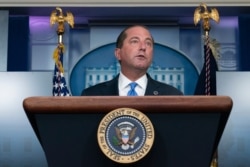The Trump administration says it will release millions of COVID-19 vaccine doses it was holding back for use as second doses in order to vaccinate Americans older than 65, as well as Americans with underlying health conditions.
"Every vaccine dose that is sitting in a warehouse instead of going into an arm could mean one more life lost or one more hospital bed occupied," Health and Human Services Secretary Alex Azar said at a press briefing Tuesday of Operation Warp Speed, the Trump administration's COVID-19 vaccine program.
The vaccine rollout has been widely criticized as too slow. Of more than 25 million doses distributed, fewer than 9 million Americans had received the first shot of the vaccine as of Monday, according to the U.S. Centers for Disease Control and Prevention.
President-elect Joe Biden said on Friday that his administration would release nearly all vaccine doses once he took office on January 20.
Azar said the change in strategy was a planned response to improved confidence in the supply chain four weeks into the rollout.
"Because we now have a consistent pace of production, we can now ship all of the doses that had been held in physical reserve, with second doses being supplied by doses coming off of manufacturing lines," he said.
The limited supply of vaccines has raised concerns that releasing the reserve would mean that second doses would be delayed or denied. Azar said that would not happen.
"We are 100% committed to ensuring a second dose is available for every American who gets a first dose," he said.
Part of the reason for the slow rollout, Azar said, has been some states insisting on vaccinating all front-line health care workers and nursing home residents in the first-priority group before moving on to the next group.
CDC's guidelines "were never meant to be, somehow, first finish the first phase, then move to the second phase, then move to the third," CDC Director Robert Redfield said at the briefing.
"We now are at a time where actually there's more vaccine available than is being requested" for top-priority groups, he added, and it's time to broaden distribution.
Operation Warp Speed is opening up distribution to 40,000 retail pharmacies nationwide, with plans to expand to 70,000, according to the program's chief operating officer, Gen. Gustave Perna.
That should broaden access, he said. And "it allows us to give a place where the American people are comfortable going and receiving the shot."
The federal government also will help set up mass vaccination sites if states request it.
Starting in two weeks, Azar said, states would receive vaccine supplies based on how well they are getting shots into arms, not solely based on their eligible population.
"If you're not using vaccine that you have the right to, then we should be rebalancing to states that are using that vaccine."






